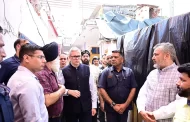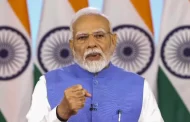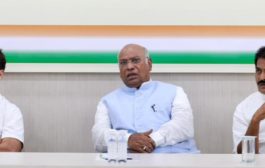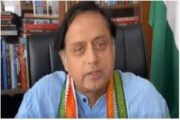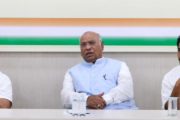The latest election results are enough to relay the fact that the fascist forces have been somewhat halted in their destructive tracks and that we can hope for better days to come

These latest election results have brought about such a relief! These results are enough to relay the fact that the fascist forces have been somewhat halted in their destructive tracks and that we can hope for better days to come.
Needless to add, these results have followed the expected strain because over the last four years, we Indians have gone through the worst forms of deceit, abuse, killings and communal divides. There has been complete anarchy. After all, it was no democratic government calling the shots but the Right Wing communal outfits prevailing with their hate agenda.
The killings and disasters that took place last fortnight at Uttar Pradesh’s Bulandshahr was just a sample of the extent to which outfits like the Bajrang Dal and VHP and other brigades flourishing under the Right Wing banner can stretch to, they can place carcasses along with concocted tales at sensitive sights to trigger off rioting and killings, they can even murder Inspector level police officers, they can even name children from the minority community in the FIR’s, like they did at Bulandshahr!
Yes, all this and much more took place just about a fortnight back, relaying some very frightening and disturbing offshoots. The fact is that the masses have seen through the bunch of lies and deceit and the divisive tactics unleashed on them by the rulers of the day.
And after these election results there is hope that the Congress would make further inroads, so that by 2019 it could come to the centre stage and bring about relief and reconstruct the basics, where one can live and survive without fear of getting lynched or hounded or targeted!
And, yes I would like to see Rahul Gandhi as the next prime minister. No, not that I know him, nor ever met him. But I have been hearing his speeches and seeing him on the small screen and his words and facial expressions and body language are enough to relay that he is straightforward, earnest and sincere. These are the qualities I look for in a leader. And I seem to have found them in him.
Mushirul Hasan: A Scholar and Academician who had such a tremendous personality
Though I’d been meeting and interacting with Professor Mushirul Hasan for years but I realized the extent of his writings and the range of his focus and diversity about nine years back when the Oxford University Press (OUP) hosted a reception at New Delhi’s India International Centre to “celebrate two decades of publishing with acclaimed historian Mushirul Hasan”.
In fact, OUP has published several of his books. If I’m not mistaken it was somewhere around that time that Mushirul Hasan’s these particular books had hit the stands: Between Modernity and Nationalism: Halide Edip’s Encounter with Gandhi’s India, and Exploring the West: Three Travel Narratives.
Not to overlook the other volumes authored, co-authored, translated and introduced by him; bringing into focus some of those tucked away voices and writings from the regional sectors. In fact, though there are several such books, one of them that stands out is Journey to the Holy Land: A Pilgrim’s Diary by Amir Ahmad Alawi (OUP), which has been introduced and translated by him along with Rakhshanda Jalil.
Needless to say, this ‘pilgrim’s diary’, originally written in 1929, would have remained tucked in some obscure quarter if Hasan hadn’t brought it to the fore and with that the various aspects and details related to the holy pilgrimage of Muslims, The Haj.
Hasan wrote extensively on India’s Partition, the country’s historical turns, contemporary history, the various aspects to the social fabric of the Muslim community, the legendary historical personalities, The Nehru era, the Islamic traditions, Muslim intellectuals in 19th-century Delhi, the historical-cum-social settings of Avadh. In fact, whatever be the focus, whatever be the theme, his style remained unchanging; the tremendous flow to his writings, bringing along that crucial factor of connectivity.
In fact, those who have interacted with him would know that even his conversation was laced with subtle relays of facts and happenings. In fact, even before one had read his volume on Turkey’s legendary woman figure Halide Edip (1884-1964), one was aware of her!
For, during an informal conversation, Hasan spoke about her extraordinary life and the times she’d lived in; narrating many of aspects of this great reformist’s career and the challenges she had faced. And again, not narrating all this in the form of some long-winding lecture but as part of a series of conversations.
And though I hail from the Avadhi belt of Uttar Pradesh, I gathered lesser known details to the historical turns in that belt only and only after reading his numerous volumes on that region.
One of his volumes The Avadhi Punch: Wit and Humour in Colonial North India (Niyogi Books) details some of the lesser known facts to those dark Raj days. To quote “Such was the popularity of the Avadh Punch that, by the end of the 19th century, 70 Punch papers /magazines had appeared from more than a dozen cities across the nation. Each one of them reflected mainly on the British rule from the experiences of over 300 million Indians with a long and proud past, but who were subjugated by force of arms and by commercial and diplomatic duplicity.”
“Equally lampooned were those who abandoned their own inherited cultural and intellectual legacies in preference of the western models Wit and humour as pacifist tools of devastation constituted an apt response to the situation.” Not to overlook his definite focus on the qasbas of Avadh in the volume titled From Pluralism to Separatism: Qasbas in Colonial Awadh.
Another noticeable feature was his ability to connect our side of the subcontinent with the West Bringing to the fore the vital cross-cultural encounters. Rather well apparent in his volume Exploring the West: Three Travel Narratives. And in the volume on Turkey’s Halide Edip, he does this by focusing and building on her connection with the Indian national movement and Mahatma Gandhi and does so rather effortlessly.
In fact, the strongest aspect to Mushirul Hasan was his personality. The years I was a visiting Professor at the Jamia Millia Islamia I could see the changes that he, as Vice Chancellor of that university had brought about on the campus. He had transformed the university into a truly academic institution, opening its long closed gates for scholars, researchers and academics from Indian and foreign universities.
There was life on the campus, with seminars and discussions and debates taking off. He’d changed the very approach and pattern to academic life. And for time to come he would be remembered through his works, his research findings and, of course, through his books.
In fact, I had last interviewed him when he had taken over as DG of the National Archives of India and much to my surprise his knowledge of our archival treasures was so very in-depth and precise. I still recall all those details he had mentioned about our range of archival treasures and though I am tempted to write those details, but space constraints stand in the way.
We have lost a brilliant academic with such a tremendous personality.
source: NH




